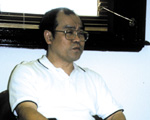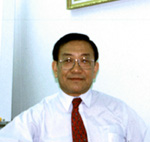 Online
Edition
Online
Edition | From
the editor Letters to the editor Milestone Answerman Periscope Campus Life Social Issues People Photo Features Education Channel Culture & Leisure Science |
| Last
Issue Archive |
| About
Varsity Advertise Media Links CUHK homepage JLM homepage |
Also
in Periscope
Party
laws needed
Four legislators?views on the system
![]()
Long march toward democratisation
In the year 2000 Legislative Council election, legislators were elected by three means: 30 were elected by functional constituencies, 24 by geographical constituencies and six by the Election Committee. The three methods employed, especially the use of an Election Committee, have been under attack.
By Ng Siu Tung & Phoebe Wong
controversial feature of the election system is the involvement of the Election Committee.
The Election Committee is composed of 800 members. They have the power to elect six Legco members.
“The Election Committee is a monster,?said Ms. Margaret Ng, who was returned to Legco by the functional constituency representing the legal profession.
“It has no public support at all. But it elects six lawmakers for 7 million Hong Kong people,?said Ms. Ng.
Mr. Wong Ngon Yin, political commentator, said the involvement of the Election Committee in the nomination of the next chief executive is even more problematic.
Said he: “The committee consists of representatives from the District Board. But the chief executive appointed some of the members of the Board.
“In 2002, the committee may have the power to nominate the next chief executive.
“That means that the next chief executive may be nominated by those appointed by Tung Chee-hwa himself.?/font>
Other than the Election Committee, critics disapprove of the Functional Constituencies as well.
Ms. Ng said functional constituencies are no longer necessary.
“In the past, the government needed professional advice to make laws.
“But now what Hong Kong people need is a more democratic form of government.?/font>
Mr. Wong, the commentator, said that legislators from functional constituencies protect only the interests of their corresponding professions.
The third method employed in elections is the system of geographical constituencies.
In spite of its democratic nature, the debate over the system is hot.
The “single-seat, single-vote?method had long been adopted in the pre-handover Legco elections.
It was replaced by a “multi-seat, single-vote?method called a list voting system during 1998 Legco elections.
The list voting system is actually a form of proportional representation.
Candidates are nominated jointly as lists and parties rank them in order of priority.
Each list may consist of any number of candidates up to the number of seats in the corresponding constituency.
Now there are five geographical constituencies in Hong Kong.
Parties and political groups gain seats in the legislature in proportion to their share of votes. Therefore a party receiving 30 percent of votes should receive 30 percent of the seats.
According to Mr. Bassanio So, principal assistant secretary of the Constitutional Affairs Bureau, the new system was implemented to facilitate administration.
The Basic Law states that the number of geographical seats will be increased steadily from 20 for the first term of Legco in 1998 to 24 for the second term in 2000 and then to 30 for the third term in 2004.
Said Mr. So: “Under the ‘single-seat, single-vote?method, when the number of geographical seats increases, the number of geographical constituencies has to be increased as well.
“That means the geographical constituencies will have to be changed from time to time. It could be a rather agonising process.?/font>
Apart from this, Mr. So said that the list voting system is fairer than the previous system.
Said he: “Under the previous system, candidates who gained a large percentage of votes might still lose in the end because only candidates who get the highest number of votes in their constituency were elected.?/font>
In this system minorites were under-represented.
However, under the current system when the chance for a candidate to gain a seat is proportional to the percentage of votes obtained, minorities can get a seat.
“It better reflects the voters?opinions as well as different voices in society, since the concerns of the minority groups can be represented,?Mr. So said.
Mr. Fung Kin Kee is the chairman of the Hong Kong Association for Democracy and People’s Livelihood and a legislator elected from a geographical constituency.
He holds a different view.
“When a constituency is enlarged, the criteria of competition becomes the parties? reputation and resources.
“It is rather difficult for small political parties like ours to gain a seat since we are not as strong as the others.?/font>
The “party effect?generally works effectively in a large constituency, especially when “political stars?in some constituencies ensure votes.
This may be the reason why all six candidates from their party, including Mr. Fung, the chairman, were totally defeated in the geographical polls in 1998.
After learning a lesson from the failure, Mr. Fung admitted that much more money was spent on promotion for the second term.
Mr. Fung said that his team spent altogether $1 million for the 2000 Legco elections.
Mr. Lee Wing Tat, a Democrat, said that the proportional representation system will protect opinion of minorities only when all legislators are returned to Legco through direct elections.
But that is apparently not the case in Hong Kong.
Prof. Wilson Wong is an assistant professor in the Department of Government and Public administration at The Chinese University of Hong Kong.
He said that the government prefers this election system to the previous one.
“The government is in favor of the current system because it can make the government stronger by strengthening the small pro-SAR political parties while restricting Democratic Party, which usually appears to be against the government.
“But such a system is actually more suitable in places where regional differences are significant, like Italy.
“This is certainly not the case in Hong Kong,?said Prof. Wong.
Mr. Lee Peng Fei, the former Liberal Party chairman who could not gain a seat after the introduction of the current system in 1996, totally agreed with Prof. Wong.
He even said that the implementation of the current system was done merely for political reasons.
“Actually,
the current system was adopted in order to cripple the power of the Democratic
Party." ![]()
|
Phoebe
Wong
 Fung
King Kee says that under the new system, more resources are devoted
to election campaigns.
|
|
|
Phoebe
Wong
 Lee Peng Fei says that the government implemented the new system solely for political reasons. |